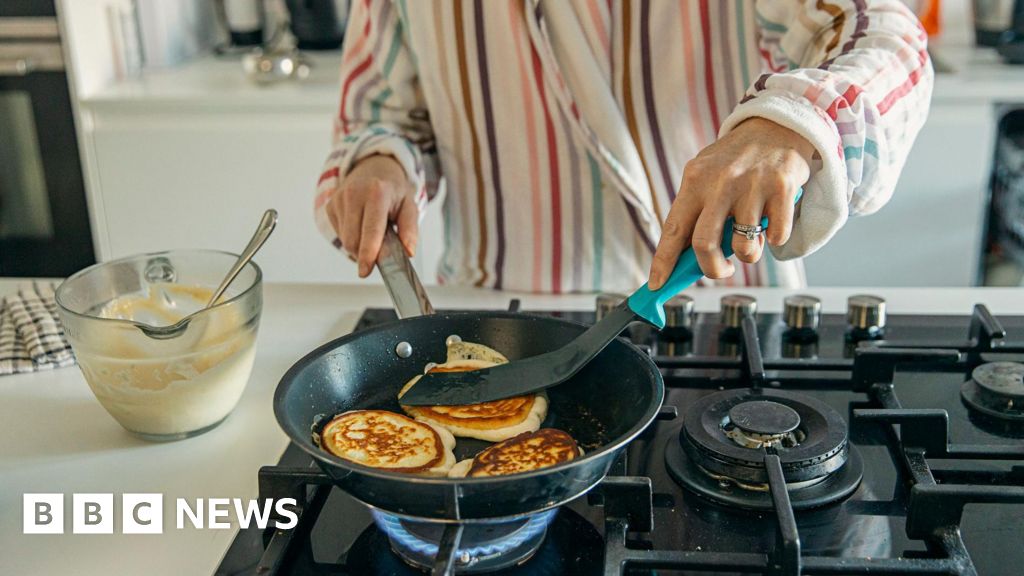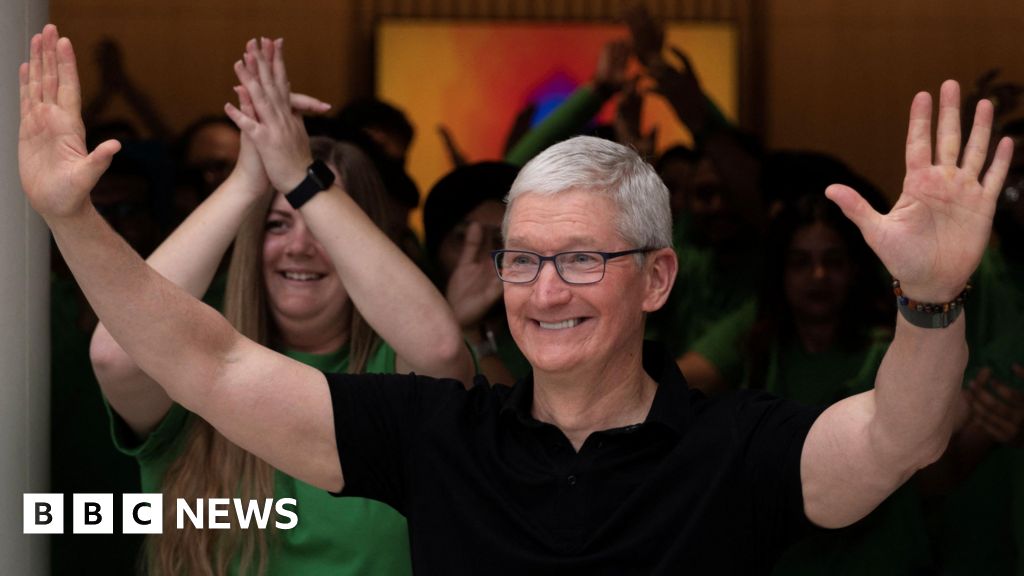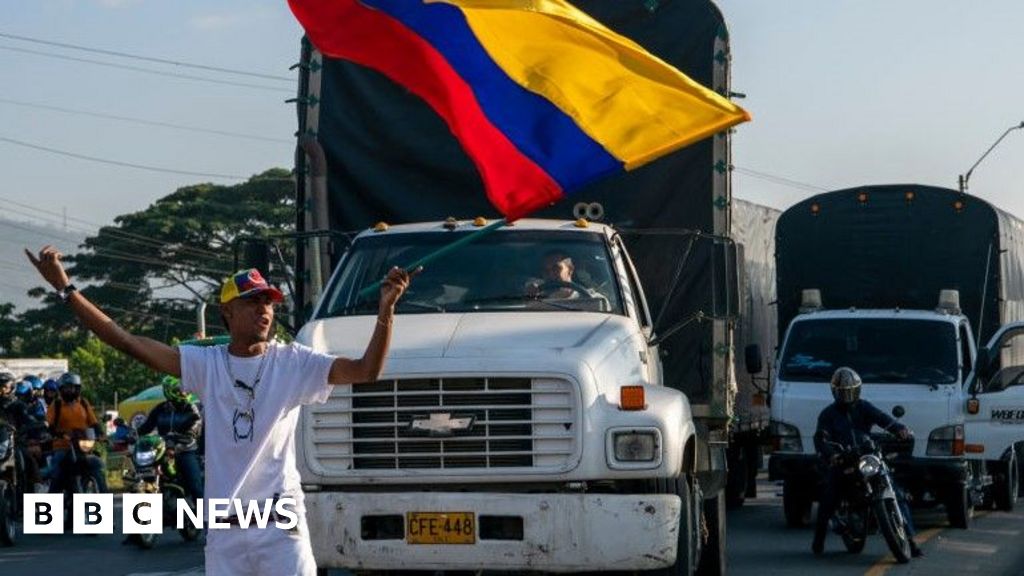ARTICLE AD BOX
By Victoria Craig
BBC reporter
Olia Hercules with friends in the UK watching a message from her brother in Ukraine
When Olia Hercules first saw what was happening in Ukraine she went through a rollercoaster of emotions. The chef and author, has lived in the UK for the last 20 years but was born and raised in Ukraine and still has family there.
"I've had really dark days, when I didn't want to live. I had days when I felt the most powerful I've ever felt in my life. And I had days when I felt completely numb," she says.
But within a fortnight she had turned her emotions to a practical purpose.
Olia's east London kitchen where she usually tests recipes is now no longer dedicated to food preparation. Instead it is the headquarters of a fundraising campaign to send protective equipment to Ukraine's soldiers, including her brother, Sasha, who has joined the fight to defend the country.
When the fighting first spread to southern Ukraine, where Olia's family is from, Sasha told her he was going to try to head for Lviv in the western part of the country. But, his plans quickly changed.
"He messaged me, and he said that he's not going to leave, that the situation is extremely desperate, and that he needs to go and join the territorial defences," Olia says.
"But he realised that when you join, you're only given a rifle and that's it. There was no protective gear, there were no helmets, no protective vests, not even kneepads. No radios, nothing."
What struck Olia in particular, was how it was ordinary people joining the fight, people like her, who a week earlier were "tapping on their laptops and drinking flat whites" but were now taking up weapons.
The conversation with her brother spurred Olia into action. She posted a video to her 70,000 followers on Instagram, asking for donations to help buy protective equipment like flak jackets, boots, and helmets for her brother and his team in Kyiv.
In just two days, she collected over £100,000. Then she set about sourcing the equipment from military surplus stores.
There was an early hiccup when the flood of donations to her Paypal account was flagged up as unusual by the algorithm monitoring transactions.
"It took a while, but we finally managed to release the funds," she says.
Then came the logistics - finding a way to send a van over to deliver the items to Ukraine.
Nevertheless, within two weeks of the start of her campaign, the items had reached their destination.
"It's just such an amazing thing," she says. "I was so worried that maybe, because Kyiv is like basically surrounded, I just thought, 'how are they going to break through?' but they did," she says.
Sasha sent her a video of him and his fellow fighters wearing the new things.
Hundreds of people across the UK, many with connections to Ukraine, have been collecting items and raising funds since the Russian invasion at the end of February.
The Disasters Emergency Committee (DEC) and other charities suggest donating money as the most effective way to ensure people in Ukraine and refugees in neighbouring countries get what they need.
DEC brings under one umbrella 15 of the country's biggest charitable organisations - including the British Red Cross and Save the Children.
The group estimates 18 million people will be affected by the war in Ukraine, and four million will be displaced. It's now actively campaigning for donations to provide food, water, shelter, healthcare and protection for those fleeing conflict.
But charities and official fundraising groups are very closely regulated in terms of what they are and aren't allowed to fundraise for and finance, points out James Maloney, a partner at London-based law firm Farrer & Co.
"There's a bit of a web of laws and regulation that you need to work your way through. Charities have purposes and those purposes set out what they can do, where they work, and who they can help," he says.
Mike Noyes, director of humanitarian aid at Action Aid UK, which is also part of the DEC group, has been on Poland's border with Ukraine, helping support women and children fleeing conflict. Action Aid has helped provide food, access to phones and medical facilities.
"The main way we plan is to listen to people and find out what they want, to make sure we're responding to their needs rather than telling them what's good for them. It's really, really important that we put the refugees from Ukraine, the people displaced within Ukraine, at the centre of our response," he says.
Olia plans to set up long-term projects to help Ukraine recover and rebuild
When Olia set out to find protective equipment for her brother, she hoped she would be able to work with a charity or group already set up with supply lines and logistics to help procure the equipment and get it to Ukraine. But nothing like that was operating, she says.
While her priority now is to continue sourcing and sending supplies to her family and friends back home, she also wants to help her country rebuild, not just physically but psychologically from the horrors of war.
"My aim is to help communities, especially where I already have family and friends," she says.
Her long-term plan is to raise money to build cookery schools, where school-leavers can learn a skill.
In the meantime she has launched a campaign called CookForUkraine. It encourages people all over the world to try their hand at cooking or baking Ukrainian dishes, but more importantly, she says, to gather around the table to discuss the war and work out how they best can help.
You can hear Olga's story on Business Daily on the BBC World Service here.

 3 years ago
50
3 years ago
50








 English (US) ·
English (US) ·